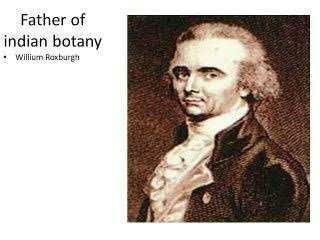NEET Exam > NEET Questions > Who is the father of Indian botany?
Start Learning for Free
Who is the father of Indian botany?
Community Answer
Who is the father of Indian botany?
Introduction:
The father of Indian botany is Dr. J.C. Bose. He was a renowned biologist, botanist, and physicist who made significant contributions to the fields of plant physiology, radio science, and biophysics.
Contribution to Indian Botany:
Dr. J.C. Bose's contributions to Indian botany were numerous. He was the first Indian scientist to study plants in a systematic way. He conducted experiments on plant growth, response to stimuli, and the effect of various physical factors on plant growth. He invented several instruments to study plant physiology, including the Crescograph and the Plant Response Recorder.
Research Work:
Dr. J.C. Bose conducted extensive research on plant physiology and published several papers on the subject. He demonstrated that plants can feel pain and respond to various stimuli, such as light, sound, and touch. He also showed that plants can communicate with each other, and that they have a complex system of communication that is similar to that of animals.
Awards and Recognition:
Dr. J.C. Bose was widely recognized for his contributions to science. He was awarded the Companion of the Order of the Indian Empire in 1903, and the Knight Bachelor in 1917. He was also the first Indian to be elected as a Fellow of the Royal Society of London.
Conclusion:
In conclusion, Dr. J.C. Bose is considered the father of Indian botany due to his extensive research and contributions to the field. His work has had a significant impact on the study of plant physiology, and his legacy continues to inspire scientists around the world.
The father of Indian botany is Dr. J.C. Bose. He was a renowned biologist, botanist, and physicist who made significant contributions to the fields of plant physiology, radio science, and biophysics.
Contribution to Indian Botany:
Dr. J.C. Bose's contributions to Indian botany were numerous. He was the first Indian scientist to study plants in a systematic way. He conducted experiments on plant growth, response to stimuli, and the effect of various physical factors on plant growth. He invented several instruments to study plant physiology, including the Crescograph and the Plant Response Recorder.
Research Work:
Dr. J.C. Bose conducted extensive research on plant physiology and published several papers on the subject. He demonstrated that plants can feel pain and respond to various stimuli, such as light, sound, and touch. He also showed that plants can communicate with each other, and that they have a complex system of communication that is similar to that of animals.
Awards and Recognition:
Dr. J.C. Bose was widely recognized for his contributions to science. He was awarded the Companion of the Order of the Indian Empire in 1903, and the Knight Bachelor in 1917. He was also the first Indian to be elected as a Fellow of the Royal Society of London.
Conclusion:
In conclusion, Dr. J.C. Bose is considered the father of Indian botany due to his extensive research and contributions to the field. His work has had a significant impact on the study of plant physiology, and his legacy continues to inspire scientists around the world.
Attention NEET Students!
To make sure you are not studying endlessly, EduRev has designed NEET study material, with Structured Courses, Videos, & Test Series. Plus get personalized analysis, doubt solving and improvement plans to achieve a great score in NEET.

|
Explore Courses for NEET exam
|

|
Who is the father of Indian botany?
Question Description
Who is the father of Indian botany? for NEET 2024 is part of NEET preparation. The Question and answers have been prepared according to the NEET exam syllabus. Information about Who is the father of Indian botany? covers all topics & solutions for NEET 2024 Exam. Find important definitions, questions, meanings, examples, exercises and tests below for Who is the father of Indian botany?.
Who is the father of Indian botany? for NEET 2024 is part of NEET preparation. The Question and answers have been prepared according to the NEET exam syllabus. Information about Who is the father of Indian botany? covers all topics & solutions for NEET 2024 Exam. Find important definitions, questions, meanings, examples, exercises and tests below for Who is the father of Indian botany?.
Solutions for Who is the father of Indian botany? in English & in Hindi are available as part of our courses for NEET.
Download more important topics, notes, lectures and mock test series for NEET Exam by signing up for free.
Here you can find the meaning of Who is the father of Indian botany? defined & explained in the simplest way possible. Besides giving the explanation of
Who is the father of Indian botany?, a detailed solution for Who is the father of Indian botany? has been provided alongside types of Who is the father of Indian botany? theory, EduRev gives you an
ample number of questions to practice Who is the father of Indian botany? tests, examples and also practice NEET tests.

|
Explore Courses for NEET exam
|

|
Suggested Free Tests
Signup for Free!
Signup to see your scores go up within 7 days! Learn & Practice with 1000+ FREE Notes, Videos & Tests.


























